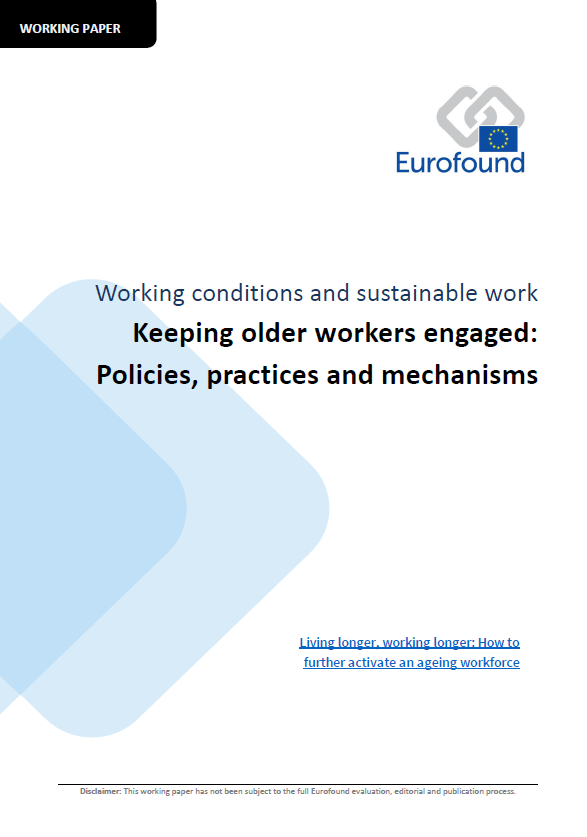EU context
Apesar do substancial crescimento das taxas de emprego entre os trabalhadores mais velhos na última década em muitos países da UE, o Relatório Conjunto sobre o Emprego da Comissão e do Conselho, de 2017, realça o potencial para um aumento ainda maior destas taxas. Em 2016, a taxa de emprego da população com idades entre 55-64 anos na UE manteve-se nos 55,3% em comparação com os 66,6% da população geral com idades compreendidas entre 15 e 64 anos. O aumento foi maior na população de sexo feminino.
O Pilar Europeu dos Direitos Sociais fornece um quadro que visa ajudar os mercados de trabalho a adaptarem-se aos novos desafios, promovendo simultaneamente a equidade e a solidariedade entre as gerações. Engloba o direito a um ambiente de trabalho adaptado às necessidades profissionais dos trabalhadores, de modo a permitir que prolonguem a sua participação no mercado de trabalho. Além disso, o recente acordo autónomo dos parceiros sociais europeus sobre o envelhecimento ativo e a abordagem intergeracional tem como compromisso facilitar aos trabalhadores mais velhos a participação ativa no mercado de trabalho e o prolongamento da vida ativa.
Trabalho da Eurofound
A Eurofound tem uma larga experiência no plano dos problemas que afetam a população ativa em envelhecimento. As investigações levadas a cabo desde os anos 90 do século XX debruçaram-se sobre a participação no mercado de trabalho, o desempenho profissional, as condições de trabalho e as preferências de trabalho dos trabalhadores seniores no contexto político do perfil demográfico europeu em mudança. O trabalho da Eurofound centrou-se igualmente no apoio público e nas iniciativas empresariais de promoção do emprego entre a população sénior. Tomou em consideração as trabalhadoras mais velhas, realçando as crescentes taxas de emprego deste grupo e a sua proporção crescente na força de trabalho, especialmente na faixa etária dos 55-64 anos.
Dados dos inquéritos
Os principais inquéritos da Eurofound fornecem um conjunto de dados sobre a situação dos trabalhadores mais velhos. O Sexto Inquérito Europeu sobre as Condições de Trabalho (EWCS) faz uma análise comparativa dos trabalhadores mais velhos nas diferentes dimensões da qualidade do emprego. Embora estes trabalhadores tenham menos probabilidades de ficar desempregados comparativamente aos trabalhadores mais jovens, os dados revelam que os trabalhadores mais velhos consideram que, se perderem o emprego, não conseguirão encontrar um novo emprego com uma remuneração idêntica e terão até dificuldades em voltar a entrar no mercado de trabalho.
Um estudo baseado no quinto Inquérito Europeu sobre as Condições de Trabalho (EWCS) da Eurofound analisa as características da mão-de-obra mais idosa e do trabalho nas diferentes idades, bem como os fatores que tornam o trabalho sustentável para uma força de trabalho em envelhecimento: boas condições de trabalho, bem-estar físico e mental e conciliação entre a vida profissional e a vida familiar.
O Inquérito Europeu sobre a Qualidade de Vida da Eurofound (EQLS) oferece conclusões relacionadas com a idade em várias dimensões da qualidade de vida na Europa. Uma análise das preferências de trabalho após os 50 anos de idade baseia-se nos resultados do terceiro EQLS e revela que muitos trabalhadores seniores preferem trabalhar menos horas, mesmo depois de considerarem as suas necessidades financeiras. Permitir que haja um maior alinhamento das horas de trabalho com as preferências de trabalho pode motivar e levar a que as pessoas trabalhem durante mais tempo.
Vidas ativas mais longas
Recentemente, a Eurofound uniu-se a três outras agências da UE na análise de trabalhos favoráveis aos idosos na Europa, dos desafios em matéria de políticas associadas a uma força de trabalho em envelhecimento e de soluções inovadoras.
Muitos trabalhadores não estão aptos nem motivados para trabalhar até à idade legal de reforma. Contudo, há um grupo que está apto e com vontade de trabalhar depois dessa idade. A Eurofound investigou este fenómeno crescente de continuar a trabalhar após a reforma.
Investigações recentes debruçaram-se sobre o prolongamento da vida ativa através de planos de pensões flexíveis, considerando em particular os planos de pensões parciais que podem facilitar esse prolongamento. As revisões a meio da carreira contributiva podem contribuir igualmente para uma vida ativa mais longa. As investigações analisaram o modo como essas revisões podem ajudar a clarificar a opção dos trabalhadores de permanecerem no ativo até uma idade de reforma mais tardia. Evidenciam, além disso, os diferentes instrumentos desenvolvidos pelas empresas para a retenção dos trabalhadores mais velhos.
Outras investigações documentam as iniciativas nacionais e setoriais levadas a cabo pelos governos e pelos parceiros sociais com vista à retenção de trabalhadores mais velhos no mercado de trabalho, incluindo incentivos financeiros e melhores condições de trabalho. Num projeto mais antigo, foram analisadas as iniciativas de gestão da idade introduzidas antes e depois da recessão para realçar as boas práticas aplicadas pelas empresas na Europa.
Recursos
- Visualização de dados: Sexto Inquérito Europeu sobre as Condições de Trabalho
- Visualização de dados: Quarto Inquérito Europeu sobre a Qualidade de Vida
- EurWORK: Atualizações regulares sobre o envelhecimento e o trabalho a nível nacional
- Base de dados de estudos de casos sobre o envelhecimento da população ativa: Exemplos de boas práticas relacionadas com questões como o recrutamento, a formação e o desenvolvimento, o trabalho flexível, a saúde, a ergonomia, etc.
- Fichas informativas no pacote de recursos «Viver mais, trabalhar melhor», de 2011, sobre: População sénior e voluntariado, Trabalhar depois da reforma, Trabalhadores mais velhos na recessão e Promoção de boas condições de trabalho
- Impacto da recessão sobre as políticas de gestão da idade - estudos de casos e relatórios nacionais
























